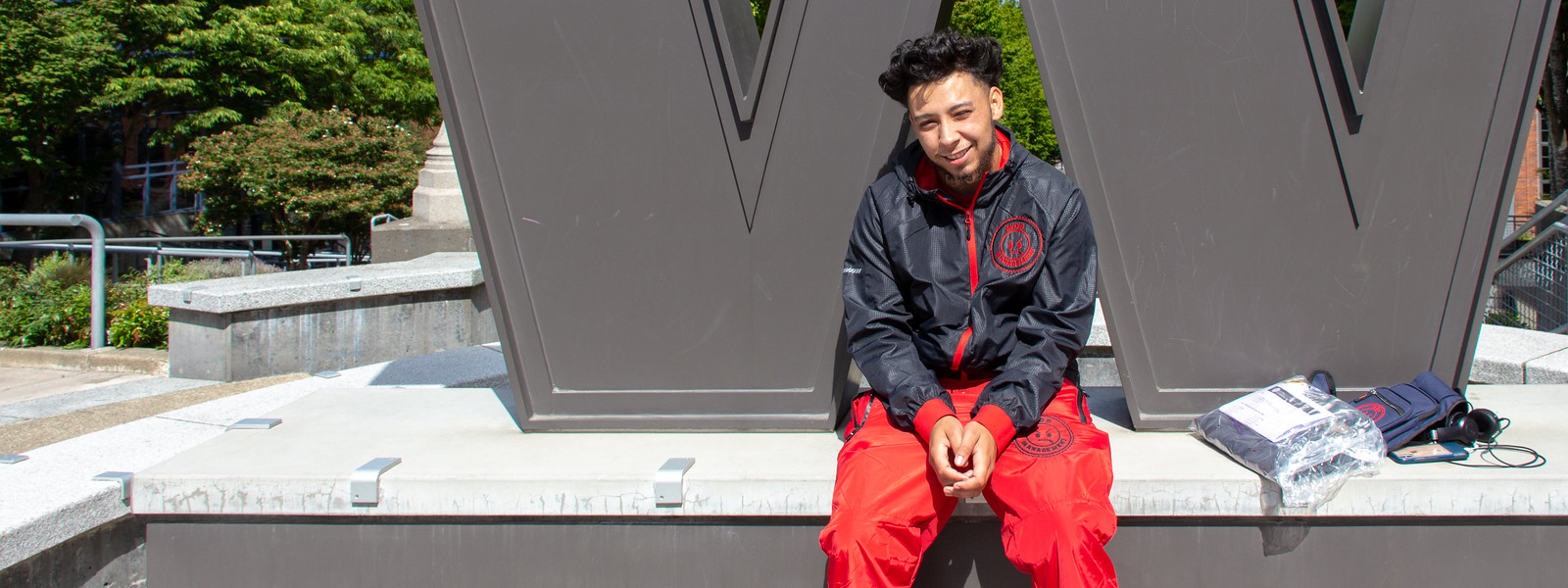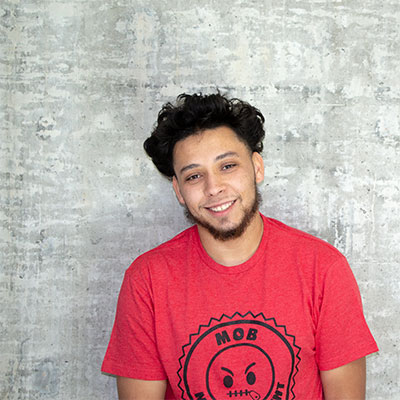
Zaheed Lynch: Switching to Justice
Moving from science and math at his high school to justice and politics at UW Tacoma put Zaheed Lynch on a path to being an advocate for youth in the criminal justice system.
As a child, Zaheed Lynch didn’t have any specific plans for his future career, but random facts about dogs and politics led him to his path through the criminal justice program at UW Tacoma.
Lynch attended the Science and Math Institute (SAMI) in Tacoma, “SAMI was so different from middle school, and I really enjoyed the freedom that came with that campus because we were so surrounded by nature,” he said. “I didn’t really like math and science all that much, but I felt like going to a traditional high school wouldn’t be the best fit for me.” When senior year came around, he wasn’t quite sure what was next until one of his teachers encouraged him to apply to college.
As a first-generation student, Lynch found college applications to be a new challenge — something he was more than up for with a little help. “This teacher helped me to apply to five or six local schools between Tacoma and Seattle, and I got accepted to all of them,” he said. “My real choice was between UW Tacoma and Pacific Lutheran University (PLU), but I really liked the Tacoma campus and its mission. My teacher from SAMI had praised the work of the professors here, and so I thought I’d give it a try.”

Lynch noted that his first year at UW Tacoma was “make it or break it” for his college career. Going to a science and math based high school without a deep interest in either subject meant that Lynch would often pursue his interests outside of school. As a result, academics became a chore with time outside of class an opportunity to pursue his true passions — politics and justice.
Luckily his first quarter at UW Tacoma started off with a bang, taking classes from Associate Professor Luther Adams and Lecturer Tonya Velasquez on the subjects of Black history and sociology. “I was inspired by Luther Adams who was so proud to be Black, I learned so much about our history that I had never known before, which really encouraged me to step outside of the box and see the world differently,” he said. “Velasquez’s sociology class really opened my eyes and gave me the terminology to better articulate the things I was trying to say about politics and our society.” After Lynch took her class, Velasquez also proved to be a mentor and supporter when he encountered difficulties. “She was so encouraging and would lift me back up anytime I was down,” he said. “As a first-generation student I felt like I wasn’t meant to be here sometimes, but she really made me feel like this was a space for me to grow and learn.”
Lynch made the decision to pursue a degree in criminal justice. The knowledge he picked up in the classroom compelled him to get an internship with Community Passageways, a Seattle nonprofit. “At Community Passageways, we work with at-risk youth to try and implement restorative justice practices,” he said. “Many are fighting felony charges even at a young age, so we work with stakeholders in the community to help build up the lives of youth and find something that they can be passionate about.”
Part of Lynch’s work at Community Passageways involves doing sit-downs with prosecutors to negotiate cases as well as helping at risk youth obtain GEDs, internships, and employment so that they can become participating community members. “The goal with this program is to promote peace, reconciliation, and healing in our Puget Sound communities,” said Lynch.
Of all of Lynch’s experiences at UW Tacoma, he is most grateful for the opportunity he has had for travel. As a senior, he went to South Korea for three-and-a-half weeks to study criminal justice and psychology. “Our main focus was looking at jails and policing systems in South Korea to compare them to practices in the United States,” he said. “It was very different.” The study abroad group looked into mental health and encountered cases about addiction to smartphones and other technology. “Before this trip, I never would have considered myself addicted to my phone, so in a way I feel like I learned a lot more about myself,” he said. “Some of these cases really surprised me, because we don’t hear about them a lot in the United States, but there are murder cases over there linked to smartphone or video game addiction.”
This was the first time Lynch had been out of the country for so long, which came with its own learning experiences. “Most of the people I know haven’t been out of the country before, so my friends and family were calling me all of the time just to check up on me and see how I was,” he said. “This trip was filled with self-reflection for me. I really value traveling and the experiences it can provide when it comes to learning about other people around the world.”
Lynch also has an interest in clothing and fashion. At the beginning of the year, he started a print shop with his uncle which prints specialty and custom designs on products ranging from t-shirts to canvas. In the meantime, he’s been curating his own clothing line called Urban Akh. Paying homage to his Islamic faith, Akh means ‘brother’ in Arabic. “Islam inspires me in all that I do, and while it can be difficult at times, I feel that working towards it has made me a better person,” he said. “I found my faith at around 18 or 19, and now I feel like I have a glow to me, something different to offer in all that I do.”
Following graduation, Lynch plans to continue working with Community Passageways and experimenting with design in his print shop, Executive Prints. “Right now, I don’t think there’s anything I want to do forever,” he said. “I just want to keep doing my best to make a positive difference in the world and experience all of the life around me.”



